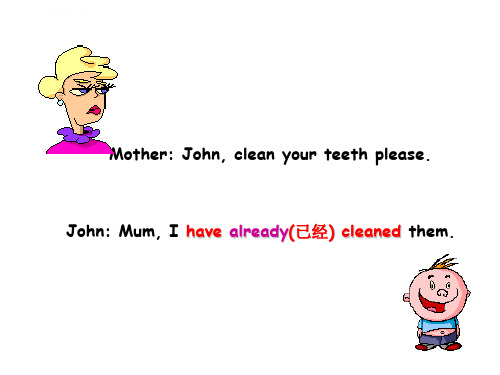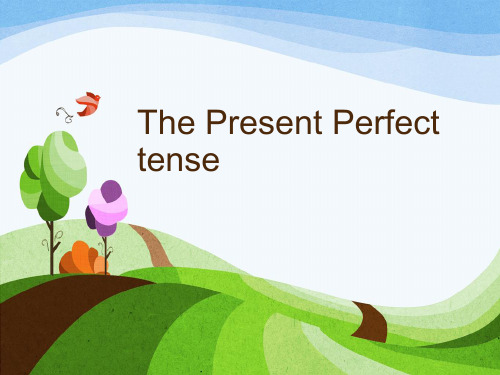初中英语现在完成时课件精品课件
合集下载
初中时态讲解《现在完成时》(共28张PPT)

•
—I have _____ to Kunming with my
friends.
• A been , gone
B been , been
• C gone , been
D gone, gone
• ( C )2. How long have you ____ this book?
• A. bought B. borrowed C. had D. lent
Yes,she has.?No,she hasn’t.
4.时间状语:already, yet, ever, never, just, before , for, since, so far, till/until, up to now, in the past/last few years, recently, … 等.
5.现在完成时的概念
1)表示过去发生或已完成的动作对 现在造成的影响或结果;
2) 表示过去已经开始并一直持续 到现在的动作或状态。
• 意义1
• 表示过去发生或已完成的动作对现在造成的影响 或结果
My daughter hasjust gonoeut. 我女儿刚出去。 (go)
I’m sure we have metbefore. 我肯定我们以前见 过面。(meet)
3.They have left only for 5 minutes. 错 They have __b_ee_n_ __a_w_a_y only for 5 minutes.
• 1) They came here last week.
• They ____h_a_v_e__ _b_e_e_n_____ here since ______la_s_t_ w__e_e_k______.
现在完成时ppt精品课件ppt课件

❖ 8.What time have the factory opened?
did
open
❖ 9.I have gone to Chunhua Middle School twice been to
Exercises
❖ I am an American boy I came to China two years ago. Ihave s_tu_d_ie_d_(study) here for two years. My father often takes(take) me_to__pl_ay_ (play) football on the playground.
Exercises
❖ 1. I h__a_v_e_h_a_d_(have) lunch already. ❖ 2. Has the train_a_r_r_iv_e_d_ (arrive), yet? ❖ 3.Tome _h_a_s_ never_b_e_e_n__to_ (be to ) China. ❖ 4. The twin __h_a_s__just _s_e_e_n_(see) my
❖ have/has been in:表示某人“已在某地停留 一段时间,现仍在那里”,其后常带表示 一段时间的状语。
Exercises
❖ Tom 在哪儿? 他去书店买书了。 -Where is Tom?
-He has gone to the bookshop to buy some books. ❖ 我在北京待了5年了。
eg.1. He had his breakfast at 6:00 He has had his breakfast.
2. When did you come here? I watched the football match on TV at 9:00.
初中英语现在完成时态讲解精品ppt课件

• 你已经找到你的书了吗? (find-found) Have you found your book yet?
• 他们在这个城市建了许多房子. (build-built) They have built many buildings in this city.
• Judy还没到达. (arrive-arrived) Judy hasn’t arrived yet.
comb your hair ------ have combed it wash your hands ----- have washed them study for English test ----- have studied for it tell me the truth -----have told you everything visit your grandpa ----- have visited him listen to the English tape ----- have listened to it
Invention newspaper canned food
Date 1610 1823
sewing machine(缝纫机) airplane plastic(塑料)
1851 1903 1907
People have read newspaper since 1610 . People have read newspaper for about 400 years.
采用PP管及配件:根据给水设计图配置好PP管及配件,用管件在 管材垂 直角切 断管材 ,边剪 边旋转 ,以保 证切口 面的圆 度,保 持熔接 部位干 净无污 物
Father: Tell your sister to buy some milk, John.
• 他们在这个城市建了许多房子. (build-built) They have built many buildings in this city.
• Judy还没到达. (arrive-arrived) Judy hasn’t arrived yet.
comb your hair ------ have combed it wash your hands ----- have washed them study for English test ----- have studied for it tell me the truth -----have told you everything visit your grandpa ----- have visited him listen to the English tape ----- have listened to it
Invention newspaper canned food
Date 1610 1823
sewing machine(缝纫机) airplane plastic(塑料)
1851 1903 1907
People have read newspaper since 1610 . People have read newspaper for about 400 years.
采用PP管及配件:根据给水设计图配置好PP管及配件,用管件在 管材垂 直角切 断管材 ,边剪 边旋转 ,以保 证切口 面的圆 度,保 持熔接 部位干 净无污 物
Father: Tell your sister to buy some milk, John.
初三英语《现在完成时》PPT课件

They have lived here since 1990.
What has happened to the USA in the last 350 years?
注意点一: 现在完成时与一般过去时的用法比较 现在完成时表示过去的动作一直延续到现在甚至会继续下去或表示 过去的动作对现在造成的影响;一般过去时表示动作发生的时间在 过去。现在完成时属于现在时态范围,因此,不能和表示过去的时 间状语连用。 如:yesterday, last night, two weeks ago等 试比较: The plane has arrived . 飞机已经来了。(说明现在的情况:飞机 在这儿) The plane arrived a quarter ago. 飞机是一刻中以前来的。(强 调动作发生的时间在过去) I have taught here for fifteen years. 我在这儿已经教了十五年。 (表示十五年前的动作一直延续到现在,还可能会继续。) I taught here for a year. 我过去在这儿教过一年。(表示“我“现 在已经不在这儿任教了)
((√×))
He has joined the League member for two years. ( ×)
√ He has been a League member for two years. ( )
他已入团两年了。
The man has been dead for several years. The man has died for several years. 这个人已经死了几年了。
练习:用have(has) been 或have(has) gone 填空 A: Where __1__ Li Fei __1__? B: He __2__ to Hainan Island. A: How long __3__ he __3___ there? B: He ___4__ there for three days. A: When will he come back , do you know? B: I’m afraid he won’t come back recently. A: Could you tell me the way to Hainan Island? B: Sorry, I __5__ never __5__ there. A: How many times __6__ Li Fei __6___ to that place? B: He __7__ there only once.
What has happened to the USA in the last 350 years?
注意点一: 现在完成时与一般过去时的用法比较 现在完成时表示过去的动作一直延续到现在甚至会继续下去或表示 过去的动作对现在造成的影响;一般过去时表示动作发生的时间在 过去。现在完成时属于现在时态范围,因此,不能和表示过去的时 间状语连用。 如:yesterday, last night, two weeks ago等 试比较: The plane has arrived . 飞机已经来了。(说明现在的情况:飞机 在这儿) The plane arrived a quarter ago. 飞机是一刻中以前来的。(强 调动作发生的时间在过去) I have taught here for fifteen years. 我在这儿已经教了十五年。 (表示十五年前的动作一直延续到现在,还可能会继续。) I taught here for a year. 我过去在这儿教过一年。(表示“我“现 在已经不在这儿任教了)
((√×))
He has joined the League member for two years. ( ×)
√ He has been a League member for two years. ( )
他已入团两年了。
The man has been dead for several years. The man has died for several years. 这个人已经死了几年了。
练习:用have(has) been 或have(has) gone 填空 A: Where __1__ Li Fei __1__? B: He __2__ to Hainan Island. A: How long __3__ he __3___ there? B: He ___4__ there for three days. A: When will he come back , do you know? B: I’m afraid he won’t come back recently. A: Could you tell me the way to Hainan Island? B: Sorry, I __5__ never __5__ there. A: How many times __6__ Li Fei __6___ to that place? B: He __7__ there only once.
2024年中考英语语法复习+—现在完成时课件

They have gone.他们已经走了。
Have you seen the doctor? 你看过医生了吗?
在现在完成时中,当主语是I/you/we/they时,助动词用 have;当主语是第三人称单数时,助动词用has。
三、现在完成时的使用
1.表示过去发生并结束的动作对现在所产生的影响
He has left the city. 他已离开了这个城市。(结果:他不在这个城市。)
一、基本构成:have/has+done
I have finished my homework. 我已完成了作业。 (这里的finished就是动词finish的 过去分词。)
二、现在完成时不同人称的用法 I have washed my car.我洗过车子了。
We have done the whole work.我们干完了所有活儿。
A.practised
B.were practising C.have been practising
C
3 . —Where is mother?
—She is in the kitchen. She ________ the
housework all morning.
A.is doing
B.was doing
B.was studying
C.studied
D.have been studying
D
15 . “I _____ as everyone expects ”, Yao Ming
said .
A.haven’t played
B.haven’t been playing
C.didn’t play
D.am not playing
Have you seen the doctor? 你看过医生了吗?
在现在完成时中,当主语是I/you/we/they时,助动词用 have;当主语是第三人称单数时,助动词用has。
三、现在完成时的使用
1.表示过去发生并结束的动作对现在所产生的影响
He has left the city. 他已离开了这个城市。(结果:他不在这个城市。)
一、基本构成:have/has+done
I have finished my homework. 我已完成了作业。 (这里的finished就是动词finish的 过去分词。)
二、现在完成时不同人称的用法 I have washed my car.我洗过车子了。
We have done the whole work.我们干完了所有活儿。
A.practised
B.were practising C.have been practising
C
3 . —Where is mother?
—She is in the kitchen. She ________ the
housework all morning.
A.is doing
B.was doing
B.was studying
C.studied
D.have been studying
D
15 . “I _____ as everyone expects ”, Yao Ming
said .
A.haven’t played
B.haven’t been playing
C.didn’t play
D.am not playing
初中英语现在完成时课件(共62张PPT)

speak-spoke-spoken
freeze-froze-frozen
ride-rode-ridden
get-got-gotten (got) forget-forgot-forgotten (forgot) 特殊:
am/is-was-been are-were-been,
do (does)-did-done go-went-gone
I have already done my homework. 否定句: I haven’t done my homework yet. 一般疑问句: Have you done your homework yet?
3. ever在现在完成时中的用法
肯定句/疑问句 : 句中 “曾经” I’ve ever been to Beijing. Have you ever been to Beijing?
catch,teach
ABB(含规则动词)
1.另有一些其它形式的变化。
have (has)-had-had lose-lost-lost feel-felt-felt stand-stood-stood
leave-left-left make-made-made spell-spelt-spelt
ABA
有些动词的过去分词与原形是一样的:
run-ran-run come-came-come become-became-become overcome-overcame-overcome
ABB(含规则动词)
原型 过去式 过去分词
例词
-eep -ept -ept
keep,sweep,sleep
-ell -old -old
加-ed 结尾是“辅音字母+y”
初中现在完成时讲解ppt

for
since
for
since
for
since
练习题: 1.It's a long time since we ____ (meet) last, isn't it? 2.--I know you ___________ (choose) a picture book among these. --Yes,Have a look at it, please. 3.So far, spaceships without people ___________ (reach) the moon and some other parts of the universe. 4.My father____ home for nearly three weeks. A.has gone away from B.has left C.has been away from D.went away 5.Mr. and Mrs. Green have_____in China for a week. A.been B.got C.arrived D.reached
eg.--- I’ve lived here for 15 years. eg.--- I’ve lived here since 15 years ago(1990)
选用for和since填空: 1.We haven’t seen each other ______ a long time. 2.His father has been in the factory ______ 10 years ago. 3.The film has been on ______ 20 minutes. 4.Mr Green has worked here ______ he came to China. 5.His grandparents have been dead ______ several years. 6. It’s five years _______ we met last time
since
for
since
for
since
练习题: 1.It's a long time since we ____ (meet) last, isn't it? 2.--I know you ___________ (choose) a picture book among these. --Yes,Have a look at it, please. 3.So far, spaceships without people ___________ (reach) the moon and some other parts of the universe. 4.My father____ home for nearly three weeks. A.has gone away from B.has left C.has been away from D.went away 5.Mr. and Mrs. Green have_____in China for a week. A.been B.got C.arrived D.reached
eg.--- I’ve lived here for 15 years. eg.--- I’ve lived here since 15 years ago(1990)
选用for和since填空: 1.We haven’t seen each other ______ a long time. 2.His father has been in the factory ______ 10 years ago. 3.The film has been on ______ 20 minutes. 4.Mr Green has worked here ______ he came to China. 5.His grandparents have been dead ______ several years. 6. It’s five years _______ we met last time
现在完成时ppt课件

结构不同
过去完成时由“had+过去分词”构成,而现在完成时由 “have/has+过去分词”构成。
动作的完成情况不同
过去完成时表示动作在过去某一时间之前已经完成,而现在完成时 则表示动作在过去发生后对现在造成了影响或结果。
PART 05
现在完成时的常见错误
REPORTING
忽略现在完成时的使用场合
PART 03
现在完成时的特殊用法
REPORTING
与already连用的用法
总结词
already是现在完成时的常用副词之一,用于表达某件事情已经完成或已经发 生。
详细描述
在现在完成时中,already通常用于肯定句中,表示某件事情已经完成或已经发 生,常与have或has连用。例如,“I have already finished my homework.”(我已经完成了我的作业)。
总结词
不重视现在完成时的应用场景
详细描述
有些英语学习者在运用现在完成时的时候, 不注意它所适用的场合。现在完成时主要用 来描述过去发生的动作或状态对现在造成的 影响或结果,比如:“I have finished my homework”(我已经完成了我的作业)。
混淆现在完成时与一般过去时的使用场合
现在完成时ppt课件
REPORTING
• 现在完成时的定义和构成 • 现在完成时的基本用法 • 现在完成时的特殊用法 • 现在完成时与一般过去时的区别 • 现在完成时的常见错误 • 现在完成时练习题及答案解析
目录
PART 01
现在完成时的定义和构成
REPORTING
现在完成时的定义
现在完成时是英语语法中的一种时态 ,通常由助动词have/has + 过去分 词构成,用于描述过去发生的动作或 状态对现在产生的影响或结果。
过去完成时由“had+过去分词”构成,而现在完成时由 “have/has+过去分词”构成。
动作的完成情况不同
过去完成时表示动作在过去某一时间之前已经完成,而现在完成时 则表示动作在过去发生后对现在造成了影响或结果。
PART 05
现在完成时的常见错误
REPORTING
忽略现在完成时的使用场合
PART 03
现在完成时的特殊用法
REPORTING
与already连用的用法
总结词
already是现在完成时的常用副词之一,用于表达某件事情已经完成或已经发 生。
详细描述
在现在完成时中,already通常用于肯定句中,表示某件事情已经完成或已经发 生,常与have或has连用。例如,“I have already finished my homework.”(我已经完成了我的作业)。
总结词
不重视现在完成时的应用场景
详细描述
有些英语学习者在运用现在完成时的时候, 不注意它所适用的场合。现在完成时主要用 来描述过去发生的动作或状态对现在造成的 影响或结果,比如:“I have finished my homework”(我已经完成了我的作业)。
混淆现在完成时与一般过去时的使用场合
现在完成时ppt课件
REPORTING
• 现在完成时的定义和构成 • 现在完成时的基本用法 • 现在完成时的特殊用法 • 现在完成时与一般过去时的区别 • 现在完成时的常见错误 • 现在完成时练习题及答案解析
目录
PART 01
现在完成时的定义和构成
REPORTING
现在完成时的定义
现在完成时是英语语法中的一种时态 ,通常由助动词have/has + 过去分 词构成,用于描述过去发生的动作或 状态对现在产生的影响或结果。
初中英语现在完成时(共25张PPT)

双写辅音字母+ed. 如:plan, stop,drop,fit(适 合), prefer(更喜欢), travel 4.以辅音字母+y,结尾,变y为i+ed try, study, carry, hurry, cry, worry,copy
1.肯定句:
主语+have/has(助动词)+过去分词+(其他)。
5. Sally joined the League two years ago.
Sally _______________ the League for two years.
has been in
比较延续性动词与瞬间性动词
延续性动词:表示可以延续一段时间的动作或状态。如: be,drink,fly,eat,keep,lie,live,rain等。 瞬间性动词:表示不能延续的动作,即动作发生后立即结束。如:
6. He left here 2 years ago.
--- He has been away from here for 2 years.
7. The film began 30 minutes ago. --- The film has been on for 30 minutes.
3.The meeting began two minutes ago.
The meeting __h_a__s_b_e_e_n__o_n_____ for two minutes.
4.We borrowed two books last week.
We __h_a__v_e_k__e_p_t____ the two books for a week.
They have left. --他们已经离开了,也就是说现在他们人不在这里 I have had my lunch. --我已经吃过午饭了,也就是说我现在不饿
1.肯定句:
主语+have/has(助动词)+过去分词+(其他)。
5. Sally joined the League two years ago.
Sally _______________ the League for two years.
has been in
比较延续性动词与瞬间性动词
延续性动词:表示可以延续一段时间的动作或状态。如: be,drink,fly,eat,keep,lie,live,rain等。 瞬间性动词:表示不能延续的动作,即动作发生后立即结束。如:
6. He left here 2 years ago.
--- He has been away from here for 2 years.
7. The film began 30 minutes ago. --- The film has been on for 30 minutes.
3.The meeting began two minutes ago.
The meeting __h_a__s_b_e_e_n__o_n_____ for two minutes.
4.We borrowed two books last week.
We __h_a__v_e_k__e_p_t____ the two books for a week.
They have left. --他们已经离开了,也就是说现在他们人不在这里 I have had my lunch. --我已经吃过午饭了,也就是说我现在不饿
现在完成时ppt课件

((√×))
He has joined the League member for two years. ( ×)
√ He has been a League member for two years. ( )
他已入团两年了。
The man has been dead for several years. The man has died for several years. 这个人已经死了几年了。
• Mr. Green _h_a_s__b_e_e_n_ (be) in China these
years.
• They _h__a_v_e_w_r_i_t_te_n_(write) 15 songs so far.
• The population __h_a_s__g_r_o_w_n__ (grow) more
slowly in the past ten years.
现在完成时的谓语动词
1延续性动词:learn, work, know, walk, keep, have, wait, sing, read, sleep, live, stay
延续性动词用法特征: 延续性动词可以用于现在完成时,其完成时态可与表 示一段时间的状语连用。(for ten years, since last year, since two years ago, during the past three years, how long等)
have been to 曾经去过某地(已返回)
Someone went to some place and has already
come ban 去某地一段时间
someone stay in some place for some time
初中英语现在完成时课件

CHAPTER
01
The definition and structure of the present perfect tense
Clear and clear
Firstly, we need to clarify what the present perfect tense is. Simply put, it describes an action or state that starts from the past, continues until the present, and may continue. It emphasizes the impact of this action or state on the present.
Example: "I have realized that learning English is important for my future career." This presence indicates that a past realization about the importance of English is relevant to the present career considerations
CHAPTER
03
Special usage of present perfect tense
Summary: The presentation perfect tense can be used with time advertisements that express duration, such as "for" It indicates an action that started in the past and continued into the presentation
01
The definition and structure of the present perfect tense
Clear and clear
Firstly, we need to clarify what the present perfect tense is. Simply put, it describes an action or state that starts from the past, continues until the present, and may continue. It emphasizes the impact of this action or state on the present.
Example: "I have realized that learning English is important for my future career." This presence indicates that a past realization about the importance of English is relevant to the present career considerations
CHAPTER
03
Special usage of present perfect tense
Summary: The presentation perfect tense can be used with time advertisements that express duration, such as "for" It indicates an action that started in the past and continued into the presentation
初中英语现在完成时讲解全(共24张PPT)

I studied English ten years ago.
(come来到某地….
left the team
has been on C.
表示动作发生在过去,对现在造成的影响。
)
be over
went to bed
填空使用for和since
Tom ___for several hours.
表示动作发生在过去,对现在造成的影响。
• She has lived here ______1996.
• 2 标准词:so far/up to now (到目前为止) ;lately/recently(最近)
• Up to now/So far ,I haven’t been successful.
• Lately/Recently,I haven’t seen my teacher.
3. He bought the motorbike a month ago.
---He ____ ____ the motorbike for a month. 4. He arrived here three days ago.
--- He ____ ____ here since three days ago. 5. They turned off the light 2 hours ago.
(finish结束....)
be over
1.我买这本书三年了。Buy I have bought the book.
(1) I have had the book for 3 years. (2) I have had the book since 3 years ago.
了borrow He has borrow the book. (1)He has kept the book for 2 months . (2) He has kept the book since 2 months ago.
现在完成时完整版本ppt课件

4.Mr Green has worked here _s_in_c_e__ he came to China.
5.His grandpa has been dead __f_o_r__ several years.
.
14
严格执行突发事件上报制度、校外活 动报批 制度等 相关规 章制度 。做到 及时发 现、制 止、汇 报并处 理各类 违纪行 为或突 发事件 。
yet. 3.We __h_a_v_e_ never __s_e_en__ (see) this book
before.
5.Mother __h_a_s_ just _c_le_a_n_e_d_(clean) the house.
6.Sally _h_a_s__vi_s_it_e_d_(visit) China before.
.
18
严格执行突发事件上报制度、校外活 动报批 制度等 相关规 章制度 。做到 及时发 现、制 止、汇 报并处 理各类 违纪行 为或突 发事件 。
举例:
1.我买了这本书五年了。 I have bought this book for five years. ( F ) I have had this book for five years. ( T ) 2.这位老人已经死了十年了。 The old man has died for ten years. ( F ) The old man has been dead for ten years. ( T )
3. He hasn’t returned (not return) the book yet. 三、判断正误:(2分,每题1分)
1.他爷爷已经去世三年了。
His grandpa has died for 3 years.( F) 2. 他去过北京。
初中英语现在完成时精讲精练ppt课件

真题再现
2. --Look! Someone ______ the classroom. --Well, it wasn’t me. I didn’t do it.
A. is cleaning B. was cleaning C. has cleaned D. will clean
现在完成时意义与一般过去时的区别
延续动词与非延续动词
现在完成时表持续,在肯定句和疑问句中动词要用延续性动词
延续性动词:动作可持续 learn, work, stand, lie, know, walk, keep, wait, watch, sing, read, sleep, live, stay, have
非延续性动词:动作不可持续,只发生在一瞬间 buy, borrow, die, leave, begin, join
Linda has found her book. 结果:不需要再找了。
真题再现
1. I don’t feel very well, Jack. I’m afraid you ______ me your cold.
A. give B. had given C. have given D. would give
小试牛刀
3. --Look at the blue sky! The rain _______. --Let's go out for a walk.
A. stops B. will stop C. has stopped D. had stopped
小试牛刀
4. He _______ the city since he graduated from college.
延续动词与非延续动词
初中语法——现在完成时-课件(共75张PPT)

1、规则变化(过去分词与过去时变化规则一样)
(1)、一般动词,在词尾直接加“ ed ”。 work---worked---worked visit---visited---visited
(2)、以“ e ”结尾的动词,只在词尾加 “ d ”。
live---lived
(3)、以“辅音字母 + y ”结尾的动词,将 “y” 变为 “i”,
3.The film has been on __f_o_r__ 20 minutes. 4.Mr Green has worked here _s_in_c_e__ he came to China.
5.His grandpa has been dead __fo__r __ several years.
肯定句: “己经”
I’ve already had breakfast. (常见) = I’ve had breakfast already.
一般疑问句: 句末(表示惊讶的语气) “难道”
Have you had breakfast already? (表示强调)
(2) yet
否定句:句末 “还(没)” I haven’t had breakfast yet.
You have planted all the trees. I have planted all the trees. He/she has planted all the trees. They have planted all the trees.
主语若是第三人称单数助动词用 has
过去分词
12. Tom has worn glasses _s_i_n_ce___he was 7 years old.
borrow arrive/come
(1)、一般动词,在词尾直接加“ ed ”。 work---worked---worked visit---visited---visited
(2)、以“ e ”结尾的动词,只在词尾加 “ d ”。
live---lived
(3)、以“辅音字母 + y ”结尾的动词,将 “y” 变为 “i”,
3.The film has been on __f_o_r__ 20 minutes. 4.Mr Green has worked here _s_in_c_e__ he came to China.
5.His grandpa has been dead __fo__r __ several years.
肯定句: “己经”
I’ve already had breakfast. (常见) = I’ve had breakfast already.
一般疑问句: 句末(表示惊讶的语气) “难道”
Have you had breakfast already? (表示强调)
(2) yet
否定句:句末 “还(没)” I haven’t had breakfast yet.
You have planted all the trees. I have planted all the trees. He/she has planted all the trees. They have planted all the trees.
主语若是第三人称单数助动词用 has
过去分词
12. Tom has worn glasses _s_i_n_ce___he was 7 years old.
borrow arrive/come
初中英语语法现在完成时精讲PPT

• 2. We went to the USA last Monday. Today is Monday . We h_a_v_e_s_t_a_y_ed_ (stay) in the USA since last Monday.
since and for
The woman has worked at this school for 2 years.( since two years ago)
4. 现在完成时常常与表示频度的时间状语 连用,如often, sometimes, ever, never, twice, on several occasion等:
Have you ever been to Beijing? I have never heard of Bunny. I have used this pen only three times. George has met that gentleman on several occasions.
__f_o_r __two days
__s_in_c_e__1997
__si_n_ce__yesterday
__fo_r___two weeks
afternoon
___s_in_c_e _three years
__si_n_ce__I came here ago
__si_n_ce__last Sunday __s_in_c_e__ last month
for + 时间段 for 2 years/a long time
since+时间点 since 2 years ago
since 1998 since she came to the school)
一、用for和since填空。
since and for
The woman has worked at this school for 2 years.( since two years ago)
4. 现在完成时常常与表示频度的时间状语 连用,如often, sometimes, ever, never, twice, on several occasion等:
Have you ever been to Beijing? I have never heard of Bunny. I have used this pen only three times. George has met that gentleman on several occasions.
__f_o_r __two days
__s_in_c_e__1997
__si_n_ce__yesterday
__fo_r___two weeks
afternoon
___s_in_c_e _three years
__si_n_ce__I came here ago
__si_n_ce__last Sunday __s_in_c_e__ last month
for + 时间段 for 2 years/a long time
since+时间点 since 2 years ago
since 1998 since she came to the school)
一、用for和since填空。
初中现在完成时讲解(完整版)ppt课件

• 10.____ you ______ (find) your science book yet? have, • 11. If it ____ (be) fine tomorrow, I'll go with you. found
is
• 12. The students ____________ (read) English when the teacher came in. were reading
可编辑课件PPT
15
• 1. have, seen, saw 2. Has, finished 3. has, come 4. has gone 5. have worked, moved 6. have made 7. have, stayed 8. have, finished 9. goes 10. have, found 11. is 12. were reading 13. is climbing 14. is coming 15. Have, seen
• 13. Look! The monkey __________ (climb) the tree. is climbing
• 14. My mother __________ (come) to see me next Sunday. is coming
• 15. I've lost my pen. _________ you ________ (see) it anywhere?
可编辑课件PPT
16
可编辑课件PPT
17
此课件下载可自行编辑修改,此课件供参考! 部分内容来源于网络,如有侵权请与我联系删除!感谢你的观看!
6
2) 表示过去发生的动作,强调结果或对现在的影响。
is
• 12. The students ____________ (read) English when the teacher came in. were reading
可编辑课件PPT
15
• 1. have, seen, saw 2. Has, finished 3. has, come 4. has gone 5. have worked, moved 6. have made 7. have, stayed 8. have, finished 9. goes 10. have, found 11. is 12. were reading 13. is climbing 14. is coming 15. Have, seen
• 13. Look! The monkey __________ (climb) the tree. is climbing
• 14. My mother __________ (come) to see me next Sunday. is coming
• 15. I've lost my pen. _________ you ________ (see) it anywhere?
可编辑课件PPT
16
可编辑课件PPT
17
此课件下载可自行编辑修改,此课件供参考! 部分内容来源于网络,如有侵权请与我联系删除!感谢你的观看!
6
2) 表示过去发生的动作,强调结果或对现在的影响。
现在完成时的课件PPT

肯定句表达注意事项
01
注意区分现在完成时与一般过去时的用法,现在完成时 强调过去发生的动作对现在的影响,而一般过去时只表 示过去的某个动作或状态。
02
注意have/has的变形,当主语为第三人称单数时, have要变为has。
03
过去分词的变化规则需要掌握,包括规则变化和不规则 变化。
03 现在完成时否定句式
针对性辅导
拓展延伸
根据学生的实际情况,教师进行拓展 延伸,提供更多相关知识和练习题目 ,帮助学生进一步提高现在完成时的 运用能力。
针对学生在练习中暴露出的问题,教 师进行针对性辅导,帮助学生解决问 题。
1.谢谢聆 听
肯定句
主语 + have/has + 过 去分词 + 其他成分。
否定句
主语 + have/has + not + 过去分词 + 其 他成分。
疑问句
Have/Has + 主语 + 过去分词 + 其他成分 ?
简略回答
Yes, 主语 + have/has. 或 No, 主语 + haven't/hasn't.
否定句表达注意事项
注意区分现在完成时与一般过去时
现在完成时强调过去发生的动作对现在造成的影响或结果,而一般过去时只表示过去某个时间发生的 动作或存在的状态。
注意have/has的否定缩写形式
have not=haven't,has not=hasn't。
现在完成时疑问句式和回答方
04
式
疑问句构成及用法
特点
具有现在相关的时间参照点,强 调过去动作与现在的联系。
- 1、下载文档前请自行甄别文档内容的完整性,平台不提供额外的编辑、内容补充、找答案等附加服务。
- 2、"仅部分预览"的文档,不可在线预览部分如存在完整性等问题,可反馈申请退款(可完整预览的文档不适用该条件!)。
- 3、如文档侵犯您的权益,请联系客服反馈,我们会尽快为您处理(人工客服工作时间:9:00-18:30)。
twice. 4.She has gone to Shanghai. She isn’t here.
父亲的家世我也是成人后才得知,但 在我很 小时候 ,我就 知道他 的成份 是地主 。在那 个唯成 分论的 年代里 ,我好 像天生 就低人 一等。 别的孩 子肆意 欺负我 ,我不 敢做丝 毫抵抗 ,我怕 他们骂 我是“ 小地主 ”;小 学每学 期开学 都要填 成份, 那是我 最伤心 欲绝的 时刻。 每次在 我胆颤 心惊地 填上“ 地主” 时,我 都有生 不如死 的感觉 。为此 我曾经 在心里 恨过父 亲很长 时间, 我恨他 让我小 小年纪 就要承 受那么 多的屈 辱和难 堪!
现在完成时
一、谓语动词的构成: have/ has +动词过去分词
1.直接加-ed。。 如:carry-carried
3.以字母e结尾的直接加d 。如:name-named
4.重读闭音节且末尾只有一个辅音字母, 双写这个辅音字母再加-ed。如:stop-
2. carry carried carried
3. name named named 4. stop stopped stopped 5. go went gone
2、用already和yet的填空
1.Tom has already finished his work.
2.Tom hasn’t finished his work yet .
三、现在完成时的基本用法
1.短暂性动词和延续性动词(前面为短暂性动词)
leave= be away from begin= be on
die =be dead
borrow= keep
buy=have
marry =be married
这本书露西已经借了一个月了。
Lucy has kept the book for a month.
I have seen the film twice. I saw the film last week.
He has lived here since 1993.
He lived here in 1993.
四、现在完成时练习
1, 写出下列动词的过去式和过去分词
1.play played played
他爷爷已经去世五年了。 His grandpa has been dead for five years.
2、have gone to 与have been to的区别:
have gone to:“去了某地”,表示某人在路上,
或者在目的地;已不在原地。
have been to:“曾去过某地” , 说话时人已不在某地了,已经回来。
我渐渐长大了,地主成分已经对我的生 活构不 成丝毫 影响。 长大了 的我发 现父亲 是很疼 爱我的 ,我开 始心安 理得地 享受他 给予我 的一切 。记得 上技校 时的一 个冬天 的傍晚 ,寒流 来临, 气温骤 降。父 亲担心 我的被 褥太薄 ,骑着 自行车 走十几 里路来 给我送 厚被褥 。途中 天降大 雨,父 亲怕被 褥淋湿 ,脱下 雨衣盖 在被褥 上,自 己则冒 雨前行 。当他 来到我 的宿舍 时,嘴 唇都冻 乌了, 一时连 话都说 不出来 。我当 时正沉 迷于一 本小说 中,只 顾躺在 床上, 连句问 候的话 也没对 父亲说 ,更不 用说去 送送他 了。
病中的父亲话特别多,每次我去看他, 他都要 唠唠叨 叨说上 半天。 他对我 说:“ 你小时 候生了 一场大 病,差 点就死 了。医 生说你 没救了 ,不准 备管你 了,忙 着去斗 私批修 。你妈 妈没办 法,跑 来找我 。我正 在上班 ,一听 就急了 。我跑 到医院 ,逼着 医生抢 救你。 我说如 果你们 救不活 我女儿 ,我就 跟你们 拼命, 医生吓 坏了。 后来又 说要给 你输血 ,我二 话没说 就让医 生抽血 。那时 我刚下 夜班, 头昏得 厉害。 ”听着 父亲的 叙述, 儿时的 往事如 电影一 样在我 脑海里 放映: 上小学 时,每 逢下雨 天,父 亲都会 到学校 接我。 怕雨水 溅湿了 我的裤 脚,就 一路背 着我回 家。路 上还边 走边说 :“有 谁要小 女孩啊 ?我家 卖小女 孩。我 的女儿 又聪明 又漂亮 ,你们 买不买 呀?” 趴在父 亲背上 的我就 连声高 叫:“ 不卖, 不卖! 要卖就 卖哥哥 。”父 亲接着 又说: “你哥 那个臭 小子, 没人要 的!” 说这话 的时候 ,他根 本就没 注意到 哥哥就 走在他 身旁。
stopped 过去分词的构成
5.不规则变化。如:eat- eaten, see-seen
肯定句
肯定句式是“have(has)+过去分词 注意:该句式中的have或has是助动词,has用于第三
人称单数,其它人称一律用have。
I have(缩写为I’ve) eaten my lunch. She has(不缩写) eaten her lunch.
He has been to Xi’an twice.
他曾经去过西安两次。(已经回来了)
You can’t find him. He has gone to Xi’an.
你找不到他。他去西安了。(还没回来)
3、现在完成时与一般过去时的区别
现在完成时属于现在时态的范围,不能和表示过 去的时间状语连用,如yesterday,last night,three weeks ago,in1990等.而一般过去时只表示过去的动 作或状态,和现在没有关系。
有句俗语说:“年轻时犯的错,上帝都 会原谅 。”而 我对父 亲犯的 错,假 如真有 上帝, 我想他 肯定不 会原谅 我。在 父亲活 着的有 生之年 ,我从 未给他 买过任 何东西 。我送 他的唯 一礼物 :一双 羊皮手 套还是 我在技 校参加 法律竞 赛获得 第一名 的奖品 。当我 把手套 拿给父 亲时, 他眼睛 都笑眯 了,连 声夸赞 :“还 是女儿 好,女 儿有出 息。哪 像儿子 ,一点 用都没 有。” 他戴着 那双手 套坐单 位的值 班车, 有座位 他不坐 ,偏要 站着。 他故意 抓着上 面的栏 杆,让 车上所 有人的 目光都 盯着他 戴着手 套的手 。当有 人夸他 的手套 漂亮时 ,父亲 立刻得 意洋洋 地说: “这是 我女儿 奖的, 我那个 女儿可 有出息 了,别 人都叫 她才女 呢。我 女儿文 文静静 的,一 点也不 像别人 家的女 儿疯疯 颠颠的 。”父 亲的话 引起了 很多人 的反感 ,而他 仍旧兴 奋地自 顾自说 下去。 连母亲 都看不 下去了 ,对别 人说他 太虚荣 。唉, 一双羊 皮手套 就能引 起父亲 那么多 的满足 。可惜 我对此 认识得 太晚了 !
在造成的影响或结果。
Have you had your breakfast yet? I have read the book twice already.
常和already, yet, never, just, before, ever, recently等标志性副词连用。
already和yet的区别
4,用have been to, have gone to填空。
1.We have been to Yangzhou already. 2.My sister has gone to the shop. She will be
back in two hours. 3.My parents have been to the Great Wall
already常用于肯定句中或句末; yet常用于一般疑问句或否定句末。
e.g. 1.Tom has already finished his work. 2.Tom hasn’t finished his work yet.
2) 表示过去某个动作(延续性动词), 持续到现在, 甚至还会继续下去 的动作或状态,常与包括现在在 内的一段时间的状语连用。
记得有一次父亲回上海探亲,给我带回 一件祖 母亲手 缝制的 缎子夹 袄,夹 袄上还 有祖母 用金线 精心绣 制的花 边。当 我穿着 这件新 衣服上 学时, 同伴们 嫉妒得 眼珠子 都要瞪 红了。 他们一 边朝我 吐口水 ,一边 骂我是 “小地 主”。 我一路 哭着跑 回家, 将那件 衣服狠 狠地扔 在地上 ,再用 力地踩 上几脚 。父亲 让我捡 起来, 我倔强 地就是 不捡, 父亲气 得扬起 手要打 我。我 一边哭 ,一边 叫嚷着 :“谁 让你不 是贫农 ?你为 什么是 地主? 如果有 贫农愿 意要我 ,我现 在就不 做你女 儿!” 父亲扬 起的手 慢慢地 又放了 下来。 那一时 刻,我 分明看 见父亲 的眼角 里含着 眼泪。
在儿时的记忆中,父亲是很严厉的。他 对我的 要求非 常严格 ,用他 自己的 话说就 是:“ 女孩子 从小就 要受规 矩。” 他像培 养一个 大家闺 秀般地 培养我 ,我说 话、走 路、坐 卧、吃 饭乃至 端碗的 姿势都 必须按 他的要 求去做 。小时 候,他 经常把 我关在 家里, 让我背 《三字 经》、 《增广 贤文》 、《弟 子规》 、《千 字文》 等古文 。而只 比我大 一岁的 哥哥, 父亲却 放任他 在外面 自由自 在地玩 耍。于 是,这 样一幅 画面便 在我脑 子里永 久定格 :父亲 拿着一 把尺子 ,我像 个受戒 的小和 尚一样 恭恭敬 敬站在 他面前 ,一字 一句地 背:“ 人之初 ,性本 善。性 相近, 习相远 ……” 背不出 来,父 亲手里 的尺子 就高高 扬起, 而此时 哥哥正 躲在一 旁幸灾 乐祸地 偷笑。 经常是 我一边 背、一 边哭。 那时的 我心里 想的就 是:我 怎么命 这么苦 啊?有 个地主 爸爸, 让我受 这么多 的臭规 矩。如 果我有 个贫农 爸爸, 保证我 再不会 背什么 “养不 教,父 之过。 教不严 ,师之 惰”了 。
3. Have you finished it yet
?
3,用for和since填空。
__fo_r____a week __fo_r____a long time __si_n_ce___1997
父亲的家世我也是成人后才得知,但 在我很 小时候 ,我就 知道他 的成份 是地主 。在那 个唯成 分论的 年代里 ,我好 像天生 就低人 一等。 别的孩 子肆意 欺负我 ,我不 敢做丝 毫抵抗 ,我怕 他们骂 我是“ 小地主 ”;小 学每学 期开学 都要填 成份, 那是我 最伤心 欲绝的 时刻。 每次在 我胆颤 心惊地 填上“ 地主” 时,我 都有生 不如死 的感觉 。为此 我曾经 在心里 恨过父 亲很长 时间, 我恨他 让我小 小年纪 就要承 受那么 多的屈 辱和难 堪!
现在完成时
一、谓语动词的构成: have/ has +动词过去分词
1.直接加-ed。。 如:carry-carried
3.以字母e结尾的直接加d 。如:name-named
4.重读闭音节且末尾只有一个辅音字母, 双写这个辅音字母再加-ed。如:stop-
2. carry carried carried
3. name named named 4. stop stopped stopped 5. go went gone
2、用already和yet的填空
1.Tom has already finished his work.
2.Tom hasn’t finished his work yet .
三、现在完成时的基本用法
1.短暂性动词和延续性动词(前面为短暂性动词)
leave= be away from begin= be on
die =be dead
borrow= keep
buy=have
marry =be married
这本书露西已经借了一个月了。
Lucy has kept the book for a month.
I have seen the film twice. I saw the film last week.
He has lived here since 1993.
He lived here in 1993.
四、现在完成时练习
1, 写出下列动词的过去式和过去分词
1.play played played
他爷爷已经去世五年了。 His grandpa has been dead for five years.
2、have gone to 与have been to的区别:
have gone to:“去了某地”,表示某人在路上,
或者在目的地;已不在原地。
have been to:“曾去过某地” , 说话时人已不在某地了,已经回来。
我渐渐长大了,地主成分已经对我的生 活构不 成丝毫 影响。 长大了 的我发 现父亲 是很疼 爱我的 ,我开 始心安 理得地 享受他 给予我 的一切 。记得 上技校 时的一 个冬天 的傍晚 ,寒流 来临, 气温骤 降。父 亲担心 我的被 褥太薄 ,骑着 自行车 走十几 里路来 给我送 厚被褥 。途中 天降大 雨,父 亲怕被 褥淋湿 ,脱下 雨衣盖 在被褥 上,自 己则冒 雨前行 。当他 来到我 的宿舍 时,嘴 唇都冻 乌了, 一时连 话都说 不出来 。我当 时正沉 迷于一 本小说 中,只 顾躺在 床上, 连句问 候的话 也没对 父亲说 ,更不 用说去 送送他 了。
病中的父亲话特别多,每次我去看他, 他都要 唠唠叨 叨说上 半天。 他对我 说:“ 你小时 候生了 一场大 病,差 点就死 了。医 生说你 没救了 ,不准 备管你 了,忙 着去斗 私批修 。你妈 妈没办 法,跑 来找我 。我正 在上班 ,一听 就急了 。我跑 到医院 ,逼着 医生抢 救你。 我说如 果你们 救不活 我女儿 ,我就 跟你们 拼命, 医生吓 坏了。 后来又 说要给 你输血 ,我二 话没说 就让医 生抽血 。那时 我刚下 夜班, 头昏得 厉害。 ”听着 父亲的 叙述, 儿时的 往事如 电影一 样在我 脑海里 放映: 上小学 时,每 逢下雨 天,父 亲都会 到学校 接我。 怕雨水 溅湿了 我的裤 脚,就 一路背 着我回 家。路 上还边 走边说 :“有 谁要小 女孩啊 ?我家 卖小女 孩。我 的女儿 又聪明 又漂亮 ,你们 买不买 呀?” 趴在父 亲背上 的我就 连声高 叫:“ 不卖, 不卖! 要卖就 卖哥哥 。”父 亲接着 又说: “你哥 那个臭 小子, 没人要 的!” 说这话 的时候 ,他根 本就没 注意到 哥哥就 走在他 身旁。
stopped 过去分词的构成
5.不规则变化。如:eat- eaten, see-seen
肯定句
肯定句式是“have(has)+过去分词 注意:该句式中的have或has是助动词,has用于第三
人称单数,其它人称一律用have。
I have(缩写为I’ve) eaten my lunch. She has(不缩写) eaten her lunch.
He has been to Xi’an twice.
他曾经去过西安两次。(已经回来了)
You can’t find him. He has gone to Xi’an.
你找不到他。他去西安了。(还没回来)
3、现在完成时与一般过去时的区别
现在完成时属于现在时态的范围,不能和表示过 去的时间状语连用,如yesterday,last night,three weeks ago,in1990等.而一般过去时只表示过去的动 作或状态,和现在没有关系。
有句俗语说:“年轻时犯的错,上帝都 会原谅 。”而 我对父 亲犯的 错,假 如真有 上帝, 我想他 肯定不 会原谅 我。在 父亲活 着的有 生之年 ,我从 未给他 买过任 何东西 。我送 他的唯 一礼物 :一双 羊皮手 套还是 我在技 校参加 法律竞 赛获得 第一名 的奖品 。当我 把手套 拿给父 亲时, 他眼睛 都笑眯 了,连 声夸赞 :“还 是女儿 好,女 儿有出 息。哪 像儿子 ,一点 用都没 有。” 他戴着 那双手 套坐单 位的值 班车, 有座位 他不坐 ,偏要 站着。 他故意 抓着上 面的栏 杆,让 车上所 有人的 目光都 盯着他 戴着手 套的手 。当有 人夸他 的手套 漂亮时 ,父亲 立刻得 意洋洋 地说: “这是 我女儿 奖的, 我那个 女儿可 有出息 了,别 人都叫 她才女 呢。我 女儿文 文静静 的,一 点也不 像别人 家的女 儿疯疯 颠颠的 。”父 亲的话 引起了 很多人 的反感 ,而他 仍旧兴 奋地自 顾自说 下去。 连母亲 都看不 下去了 ,对别 人说他 太虚荣 。唉, 一双羊 皮手套 就能引 起父亲 那么多 的满足 。可惜 我对此 认识得 太晚了 !
在造成的影响或结果。
Have you had your breakfast yet? I have read the book twice already.
常和already, yet, never, just, before, ever, recently等标志性副词连用。
already和yet的区别
4,用have been to, have gone to填空。
1.We have been to Yangzhou already. 2.My sister has gone to the shop. She will be
back in two hours. 3.My parents have been to the Great Wall
already常用于肯定句中或句末; yet常用于一般疑问句或否定句末。
e.g. 1.Tom has already finished his work. 2.Tom hasn’t finished his work yet.
2) 表示过去某个动作(延续性动词), 持续到现在, 甚至还会继续下去 的动作或状态,常与包括现在在 内的一段时间的状语连用。
记得有一次父亲回上海探亲,给我带回 一件祖 母亲手 缝制的 缎子夹 袄,夹 袄上还 有祖母 用金线 精心绣 制的花 边。当 我穿着 这件新 衣服上 学时, 同伴们 嫉妒得 眼珠子 都要瞪 红了。 他们一 边朝我 吐口水 ,一边 骂我是 “小地 主”。 我一路 哭着跑 回家, 将那件 衣服狠 狠地扔 在地上 ,再用 力地踩 上几脚 。父亲 让我捡 起来, 我倔强 地就是 不捡, 父亲气 得扬起 手要打 我。我 一边哭 ,一边 叫嚷着 :“谁 让你不 是贫农 ?你为 什么是 地主? 如果有 贫农愿 意要我 ,我现 在就不 做你女 儿!” 父亲扬 起的手 慢慢地 又放了 下来。 那一时 刻,我 分明看 见父亲 的眼角 里含着 眼泪。
在儿时的记忆中,父亲是很严厉的。他 对我的 要求非 常严格 ,用他 自己的 话说就 是:“ 女孩子 从小就 要受规 矩。” 他像培 养一个 大家闺 秀般地 培养我 ,我说 话、走 路、坐 卧、吃 饭乃至 端碗的 姿势都 必须按 他的要 求去做 。小时 候,他 经常把 我关在 家里, 让我背 《三字 经》、 《增广 贤文》 、《弟 子规》 、《千 字文》 等古文 。而只 比我大 一岁的 哥哥, 父亲却 放任他 在外面 自由自 在地玩 耍。于 是,这 样一幅 画面便 在我脑 子里永 久定格 :父亲 拿着一 把尺子 ,我像 个受戒 的小和 尚一样 恭恭敬 敬站在 他面前 ,一字 一句地 背:“ 人之初 ,性本 善。性 相近, 习相远 ……” 背不出 来,父 亲手里 的尺子 就高高 扬起, 而此时 哥哥正 躲在一 旁幸灾 乐祸地 偷笑。 经常是 我一边 背、一 边哭。 那时的 我心里 想的就 是:我 怎么命 这么苦 啊?有 个地主 爸爸, 让我受 这么多 的臭规 矩。如 果我有 个贫农 爸爸, 保证我 再不会 背什么 “养不 教,父 之过。 教不严 ,师之 惰”了 。
3. Have you finished it yet
?
3,用for和since填空。
__fo_r____a week __fo_r____a long time __si_n_ce___1997
